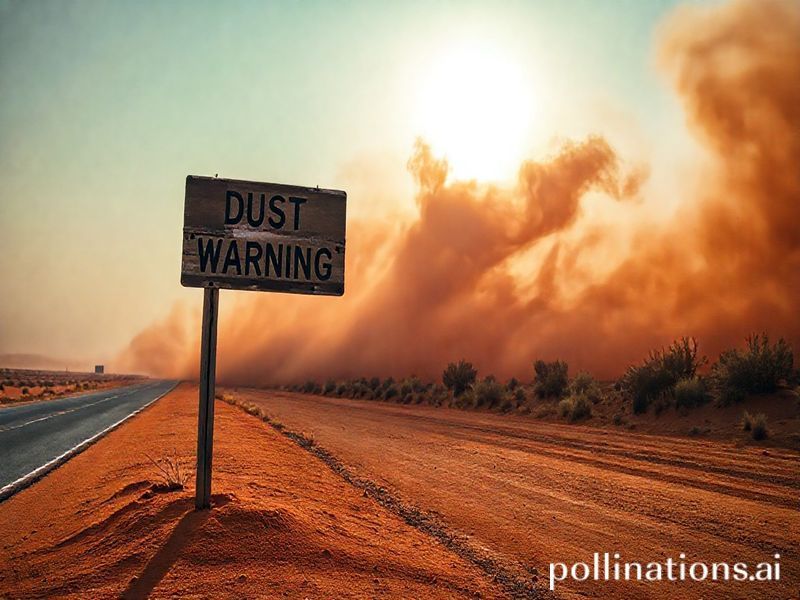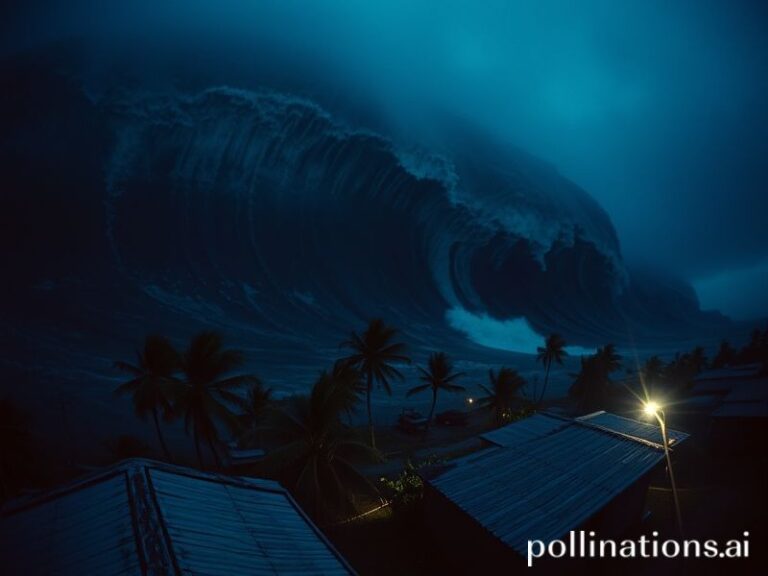dust storm warning
Dust Storm Warning: A Global Brown-Out
By the time the meteorologists in Beijing, Baghdad, and Bakersfield finish their morning Zoom, the sky has already turned the color of an overcooked latte. A dust-storm warning is now less a regional inconvenience and more an international group chat nobody asked to join. From the Sahel to suburban Sydney, fine-grained topsoil has become the world’s least welcome frequent-flyer program—mileage accrued at the expense of every border it cheerfully ignores.
Let us begin in the Gobi, where China’s latest mega-engineering marvel is a wall that, for once, isn’t made of concrete. The government is planting billions of trees in a heroic attempt to keep Mongolia’s topsoil from RSVPing to Beijing’s cocktail parties. Results are mixed: the trees are valiant, but the sand politely steps around them like a bouncer who recognizes VIP guests. Meanwhile, South Korea politely requests that its western neighbor vacuum more diligently, proving that even geopolitical shade can arrive by airmail.
Slide westward and the plot thickens—literally. In Iraq, dust storms now outnumber foreign invasions, a sentence no copy editor thought they’d ever green-light. Baghdad’s international airport has seen more closures due to airborne silt than to any regional saber-rattling, which is either progress or the bar for regional stability has been buried under six inches of topsoil. Doctors report a 20 % spike in respiratory admissions, prompting the Ministry of Health to issue face masks that match the national flag. Nationalism has never been so itchy.
Yet the real masterpiece of planetary absurdity unfolds on the Iberian Peninsula, where dust from the Sahara now fertilizes Spanish vineyards with such regularity that sommeliers can detect “notes of Algeria” in their Tempranillo. Climate scientists call it transcontinental nutrient redistribution; vintners call it terroir with a passport. Either way, the Sahara is mailing postcards written in phosphorus and postmarked “Wish you were here (but not really).”
Cross the Atlantic—yes, the dust is already there ahead of you—and the Caribbean greets African particulates like distant cousins arriving for Carnival. Barbados records “dust days” the way other islands track rainfall, and sunscreen labels now boast SPF ratings against UV and micron-sized grit. Tourists pay premium rates for Instagram shots of sunsets filtered through Saharan sepia; locals pay hospital bills for asthma. Neoliberalism never met a crisis it couldn’t monetize.
Australia, never one to miss a planetary trend, has rebranded its own dust events as “Rusty Blizzards,” a marketing coup that makes lung damage sound like an indie band. Farmers in New South Wales watch their topsoil head for the coast at 80 kph, stopping only to photobomb Sydney’s real-estate brochures. The government’s response is a drought-relief package that includes both cash subsidies and free counseling—because nothing eases existential dread like a bureaucratic mindfulness webinar.
The broader significance? Dust storms are the geological equivalent of a carbon-fueled guilt trip. Each plume is a memo from the planet’s crust reminding us that topsoil, like trust and polar ice, is non-renewable once airborne. The World Bank estimates that soil degradation costs the global economy $400 billion annually—roughly the GDP of a medium-sized petrostate, minus the private jets. Meanwhile, satellite imagery shows Earth wearing a faint brown halo, a planetary selfie filter no amount of tech bro venture capital can swipe away.
As nations tighten borders against humans, the soil votes with its feet—well, grains—and crosses them anyway. Customs officers can’t scan for sentiment, let alone sediment. The upshot is a darkly democratic phenomenon: rich or poor, we all inhale the same dirt, although the wealthy get to do it from inside HEPA-filtered penthouses. In that sense, dust is the last truly international traveler: no visa, no baggage fees, and a frequent-flyer program that accrues lung damage instead of miles.
So when your phone pings with tomorrow’s dust-storm warning, remember it’s not just local weather misbehaving. It’s the planet’s way of holding one giant, wheezy town-hall meeting. Bring a mask, bring water, and maybe—if you feel optimistic—bring a broom. After all, nobody else is coming to sweep up.







